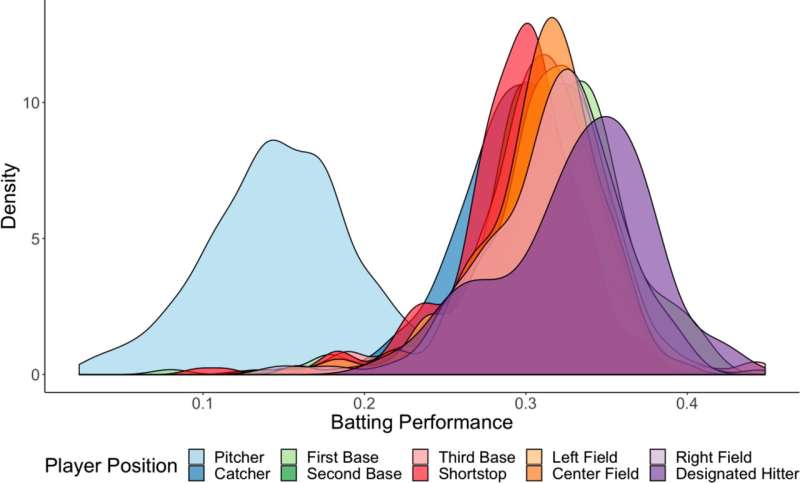Baseball reveals that specialists excel after leaving comfort zones

Venturing out of one’s comfort zone to perform a task—and then performing poorly in that task, such as a baseball pitcher trying to hit—can lead to better performance when returning to one’s specialty, new research suggests.
Brittany Bond, an assistant professor of organizational behavior in the ILR School, and Ethan J. Poskanzer of the Leeds School of Business at the University of Colorado argue that this phenomenon occurs through a process they call “forced task inferiority,” in which underperformance in tasks outside their specialty frustrates specialists, generating heightened drive that they can channel into their specialty.
Bond and Poskanzer are co-authors of “Striking Out Swinging: Specialist Success Following Forced Task Inferiority,” published May 31 in Organization Science.
While watching Game 5 of the 2018 World Series, Bond noticed something interesting about Boston’s starting pitcher, David Price. The dominant lefty became more and more frustrated as he failed in each of his three plate appearances at Dodger Stadium.
“He was getting so visibly upset when he had to bat and then still looked very angry when he returned to the mound to pitch,” Bond said. “And there was one instance where he had just been up to bat and had failed pretty miserably, and then he went to the mound and got three straight outs with just seven pitches.”
That’s when Bond learned that National League pitchers—in this case, the Los Angeles Dodgers—were required to bat throughout the season, while in the American League—including the Red Sox—pitchers were replaced in the batting order by a designated hitter. Price was required to bat in Game 5, however, because it was being played in a National League ballpark, so NL rules were in place.
Watching Price struggle at a task he was rarely required to try inspired Bond to research the performance of Major League Baseball pitchers, in order to determine whether specialists in a field are helped or hindered by engaging with non-specialist work.
“Specialization has become a real focus in the current workplace and there is this idea that having specialists engage in anything other than their specialty is going to make them less productive,” Bond said. “They may perform worse at that non-specialist task than other people and, on top of that, you’re going to break them out of flow.”
Using archival data from 22 years of MLB games and interviews with former players and coaches, Bond and Poskanzer found that specialized players (pitchers) perform better in their specialty after obligatory tasks (hitting) outside of their specialization.
Bond and Poskanzer found that in the inning following an unsuccessful at-bat:
- pitchers were .46% more likely to record an out against the first opposing batter faced;
- pitchers were .55% less likely to concede a walk against the first opposing batter faced;
- pitches thrown to the first batter were .64% more likely to be in the strike zone;
- pitchers allowed an on-base percentage of 10 points lower to opposing hitters if the game was tied.
“While these seem like small percentages, the improved performance lasts through the first three batters faced the next half-inning, and when you look at that over the course of a season, the positive effect of forced inferiority on pitcher performance is worth 3.06 runs,” Bond said. “In the time period we study, this amounts to 30.7% of one additional win per season, and any player estimated to add one full win to a team’s record would command $11.1 million in salary. So, the value of recognizing forced inferiority in team strategy would be estimated as roughly $3.41 million.”
Bond and Poskanzer also found that a pitcher’s batting performance did not change after pitching failure. So, while batting failure led to better pitching, pitching failure did not lead to similar better performance at pitching or batting.
“There are all these negative reasons why you would want to avoid getting specialists to engage in anything outside of their area,” Bond said. “Here, we found the reverse. We found that specialists could have a healthy, productive byproduct from some exposure and engagement with things at which they are inferior.
“There is also no downside when they happen to do well in their non-specialist tasks, either,” she said. “So it’s a caution against this runaway hyper-specialization we see in many organizations today.”
Though the study focuses on a unique set of elite specialized professionals, the authors believe their findings can apply more broadly to the general workforce as employers might have the need to assign specialists to tasks outside their expertise, Bond said. The study offers insight into how such tasks may be allocated without compromising the specialist’s performance, and suggests that bringing new tasks into a specialist’s job can improve performance in their specialty work.
“Our study suggests that employers should not keep their specialists isolated,” Bond said. “There can be this added upside. Even if the specialist maybe didn’t do the best work on this ‘everyday’ task, it was necessary for them to complete it as part of a team. That’s fine. It was necessary, and now you’re going to get an extra benefit for when that specialist goes back to their specialization. They’re going to go back with vigor that hadn’t been there.”
More information:
Brittany Bond et al, Striking Out Swinging: Specialist Success Following Forced Task Inferiority, Organization Science (2023). DOI: 10.1287/orsc.2023.1680. pubsonline.informs.org/doi/10.1287/orsc.2023.1680
Citation:
Baseball reveals that specialists excel after leaving comfort zones (2023, May 31)
retrieved 31 May 2023
from https://phys.org/news/2023-05-baseball-reveals-specialists-excel-comfort.html
This document is subject to copyright. Apart from any fair dealing for the purpose of private study or research, no
part may be reproduced without the written permission. The content is provided for information purposes only.
For all the latest Science News Click Here
For the latest news and updates, follow us on Google News.

